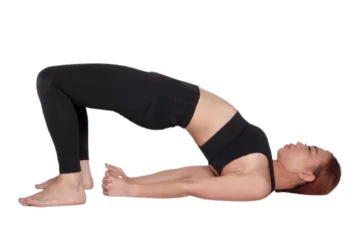Chronic back pain is a debilitating condition that affects millions of people worldwide, significantly impacting their quality of life and overall well-being.
While traditional treatments such as medication and physical therapy can provide relief, they often come with limitations and risks.
Yoga therapy offers a holistic and integrative approach to managing chronic back pain, addressing both the physical and psychological aspects of the condition.
In this article, we’ll explore how yoga therapy can be an effective tool for alleviating chronic back pain and promoting long-term healing and well-being.
Understanding Chronic Back Pain
Chronic back pain refers to persistent discomfort or stiffness in the back that lasts for more than three months. It can result from various factors, including muscle strain, injury, degenerative conditions, or structural abnormalities in the spine.
Chronic back pain may manifest as dull, achy sensations, sharp or shooting pain, or stiffness and limited mobility.
The complexity of chronic back pain often requires a multifaceted approach to treatment, addressing both the physical and emotional components of the condition.
The Role of Yoga Therapy in Chronic Back Pain Management
Yoga therapy is a specialized form of yoga that utilizes tailored practices to address specific health concerns and conditions, including chronic back pain.
Unlike generic yoga classes, yoga therapy sessions are personalized to the individual’s needs, taking into account their medical history, current symptoms, and lifestyle factors.
Through a combination of gentle movement, breathwork, mindfulness techniques, and relaxation practices, yoga therapy aims to alleviate pain, improve mobility, and promote overall well-being in individuals with chronic back pain.
Benefits of Yoga Therapy for Chronic Back Pain
- Pain Relief: Yoga therapy offers targeted exercises and stretches to alleviate pain and tension in the muscles and joints of the back, providing relief from chronic discomfort.
- Improved Mobility: Gentle movement practices in yoga therapy help to increase flexibility and range of motion in the spine, reducing stiffness and promoting better mobility.
- Enhanced Strength and Stability: Yoga therapy incorporates strengthening exercises to build muscle support around the spine, improving stability and reducing the risk of future injury.
- Stress Reduction: Mindfulness techniques and relaxation practices in yoga therapy help to reduce stress and tension, which can exacerbate chronic back pain.
- Mind-Body Connection: Yoga therapy emphasizes the connection between the mind and body, empowering individuals to develop awareness of their pain triggers and learn effective self-management strategies.
Key Components of Yoga Therapy for Chronic Back Pain:
- Assessment and Evaluation: A qualified yoga therapist conducts a thorough assessment of the individual’s back pain history, current symptoms, movement patterns, and lifestyle factors to develop a personalized treatment plan.
- Therapeutic Yoga Practices: Tailored yoga practices, including gentle stretches, strengthening exercises, therapeutic alignment techniques, and breathwork, are prescribed to address the specific needs and limitations of the individual.
- Education and Empowerment: Yoga therapy educates individuals about their condition, empowering them with knowledge and skills to manage their back pain effectively both on and off the mat.
- Mindfulness and Stress Management: Mindfulness-based techniques such as meditation, body scanning, and relaxation exercises are incorporated to help individuals reduce stress, improve coping mechanisms, and cultivate resilience in the face of chronic pain.
- Ongoing Support and Monitoring: Yoga therapy provides ongoing support and guidance as individuals progress on their healing journey, with regular check-ins, adjustments to the treatment plan, and encouragement to maintain a consistent practice.
Precautions and Considerations
While yoga therapy can be beneficial for chronic back pain, it’s essential to approach the practice mindfully and under the guidance of a qualified yoga therapist or healthcare professional, especially if dealing with complex or severe back issues.
Individuals with chronic back pain should communicate any concerns or limitations to their yoga therapist and follow their recommendations for modifications and adaptations as needed.
Conclusion
Yoga therapy offers a comprehensive and holistic approach to managing chronic back pain, addressing the physical, emotional, and spiritual dimensions of the condition.
By incorporating personalized yoga practices, mindfulness techniques, and self-care strategies, individuals with chronic back pain can find relief, improve their quality of life, and cultivate resilience in the face of adversity.
Whether you’re seeking relief from occasional discomfort or long-term management of chronic back pain, consider exploring the transformative benefits of yoga therapy as part of your healing journey.



